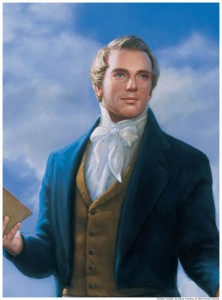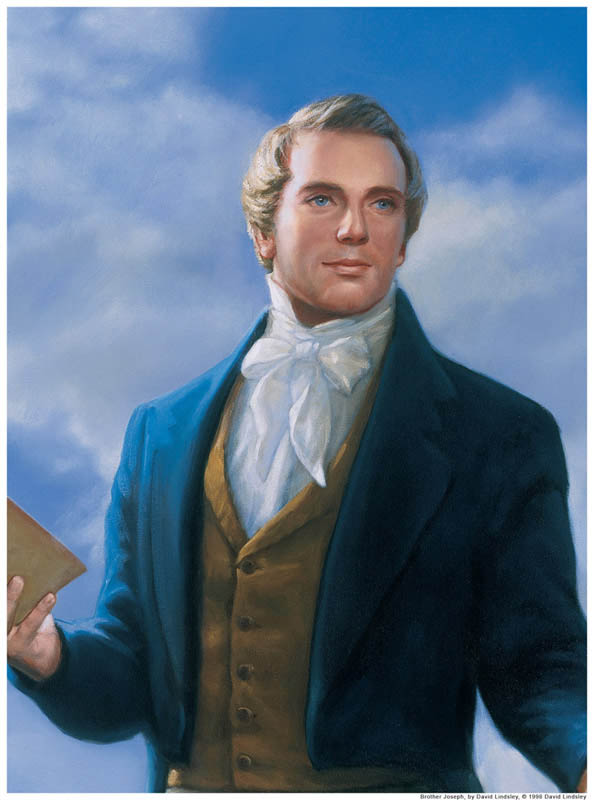Members of The Church of Jesus Christ of Latter-day Saints, known as the Mormons, believe that Joseph Smith was a prophet. That is, they see him filling the same role as Moses or Isaiah. He was called of God to teach and lead people, and to be a witness of Jesus Christ and His sacrifice.
 In discussing this, sometimes we are tempted to say, “Well, that is just a matter of faith,” and then change the subject. The implication being that talking about God is like talking about breeds of unicorns—both God and unicorns are just fantastic creatures, so any discussion of either is merely academic. Or worse—nonsensical.
In discussing this, sometimes we are tempted to say, “Well, that is just a matter of faith,” and then change the subject. The implication being that talking about God is like talking about breeds of unicorns—both God and unicorns are just fantastic creatures, so any discussion of either is merely academic. Or worse—nonsensical.
I disagree. I think these types of discussions about God can have merit, especially if done between close friends and in a relaxed setting.
Near the beginning of World War Two, Hugh B. Brown, a member of the Church who later became an apostle, had a theological discussion with a friend of his in England. They began by talking about the looming war-clouds, and then his friend, who happened to be a Member of Parliament and a lawyer, asked Hugh B. Brown to prepare a brief on his faith.
Following the advice of Peter (“Be ready always to give an answer to every man that asketh you a reason of the hope that is in you.”), Brown said that he could give him the information right then and there
The discussion (which Brown said was like the process of discovery in legal proceedings) was an intellectual rough-and-tumble. They began with discussing the MP’s personal beliefs, and then they debated a version of the Epicurean Paradox. Next they established God’s modus operandi, which led to a discussion of prophets. The two men finally formulated what Brown later called a profile of a prophet.
Here is what they came up with:
1. He will boldly claim that God had spoken to him.
2. Any man so claiming would be a dignified man with a dignified message—no table jumping, no whisperings from the dead, no clairvoyance, but an intelligent statement of truth.
3. Any man claiming to be a prophet of God would declare his message without any fear and without making any weak concessions to public opinion.
4. If he were speaking for God he could not make concessions, although what he taught would be new and contrary to the accepted teachings of the day. A prophet bears witness to what he has seen and heard and seldom tries to make a case by argument. His message and not himself is important.
5. Such a man would speak in the name of the Lord, saying, “Thus said the Lord,” as did Moses, Joshua, and others.
6. Such a man would predict future events in the name of the Lord, and they would come to pass, as did those predicted by Isaiah and Ezekiel.
7. He would have not only an important message for his time but often a message for all future time, such as Daniel, Jeremiah, and others had.
8. He would have courage and faith enough to endure persecution and to give his life, if need be, for the cause he espoused, such as Peter, James, Paul, and others did.
9. Such a man would denounce wickedness fearlessly. He would generally be rejected or persecuted by the people of his time, but later generations and descendants of his persecutors would build monuments in his honor.
10. He would be able to do superhuman things—things that no man could do without God’s help. The consequence or result of his message and work would be convincing evidence of his prophetic calling: “By their fruits ye shall know them” (Matthew 7:20).
11. His teachings would be in strict conformity with scripture, and his words and his writings would become scripture. “For the prophecy came not in old time by the will of man: but holy men of God spake as they were moved by the Holy Ghost” (2 Peter 1:21).
That is an impressive list, to which many other things could be added. But the point stands that Joseph Smith meets every one of these criteria. He is on equal footing with any other biblical prophets. And that is one of the reasons why I am so attracted to him.
And it goes beyond simple attraction. It is a burning and abiding faith in his mission as prophet.
On the 200th anniversary of Joseph Smith’s birth, Thomas S. Monson, now the sixteenth president of the Church, said:
“I know he was God’s prophet, chosen to restore the gospel of Jesus Christ in these latter days. I pray that as we celebrate the 200th anniversary of his birth, we may learn from his life. May we incorporate into our own lives the divine principles which he so beautifully taught—by example—that we, ourselves, might live more completely the gospel of Jesus Christ. May our lives reflect the knowledge we have that God lives, that Jesus Christ is His Son, that Joseph Smith was a prophet. (Thomas S. Monson, “The Prophet Joseph Smith: Teacher by Example,” Ensign, Nov 2005, 67)
I add my faith to his. I know that Joseph Smith was a prophet. The things that he said happened to him really did happen to him. I have come to this conclusion because I have read his words, his teachings, and his journals many times over. Moreover, I have also felt God whispering to my heart, affirming what I have studied and read.
Of course this is in the realm of faith, but we can all make that leap of faith and know that Joseph Smith was a prophet. That is what motivates me and that is why I blog.
About kendalbhunter
Twitter •


